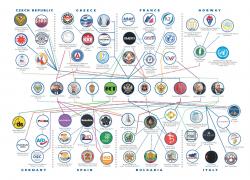Facebook's new policy: Anticipated Threat or More Transparent Digital Politics?
Mark Zuckerberg first initiated advertising transparency and authenticity updates on Facebook both in the United States and around the world back in September 2017. He highlighted that due to the issue of Russian interference in the US elections, Facebook was working on investigating fake accounts, ads platform performance during the elections and he announced future work to make political advertising more transparent.
In the early summer of 2019, Facebook introduced a policy Ads About Social Issues, Elections or Politics. According to the Facebook Business: “Advertisers running ads about social issues, elections or politics may be required to complete the ad authorization process”. It varies country by country, for example in the case of the US, authorization checklist comprises of requiring a person willing to authorize to be a page admin, to have two-factor authentication, identity confirmation document and a mailing address and a “Paid for by” disclaimer, which will allow a Facebook user see who/which organization paid for an ad.
How does Facebook define “Social issues, Elections or Politics”?
The original statement on Facebook business declares that Elections and Politics related ads can be one’s that are about a current or former candidate for public office, a political party or advocates for the outcome of an election to public office, any election, referendum, or ballot initiative, including "get out the vote" or election information campaigns, or regulated as political advertising.
In the case of the European Union, social issues might be civil and social rights, crime, economy, environmental politics, health, immigration, political values and governance, security and foreign policy.
Ad Library
One the one hand, Ad Library could be considered as a new tool to more transparent political advertising. The platform brings all the Social issues, Elections or Politics ads together regardless of the active or inactive status and keeps them visible for 7 years.
What can Facebook users check in the Ad library?
The platform allows users to see if the ad is active or inactive or if it was disapproved. Facebook also unveils the range of a budget that was spent on an ad (For example, $1K-$5K), as well as impressions, demographic information and location.
As Facebook argues, Ad Library is searchable for everyone, even though ads related to alcohol and gambling will not be available for underaged people. Facebook trusts people’s sincerity about their age. It seems this restriction does not necessarily serve its purpose since young people already create accounts and access any kind of information through surfing on the internet. At the same time, it is also under discussion, does it do worse if younger people from a certain age do not have access to ads about alcohol and gambling? Usually, Non-governmental organizations run campaigns via Facebook to educate teenagers about the outcomes of consuming alcohol and gambling. People also deserve to have bipolar information about such kind of matters.
More personal information in Facebook’s database
Now, as you are ready to authorize as an ads runner, you will need to provide your ID documents and two-factor authentication. Which on one side brings more clarity about who exactly stands behind the ad, but at the same time keeps this personal information in Facebook’s hands for 30 days, which they claim is only for identity confirmation. As we the Cambridge Analytica scandal and Mark Zuckerberg’s confession about scanning some parts of the user’s messages, the new policy only makes Facebook more predominant over our privacy information.
As it is clear from the Facebook business page, The US, European Union and other countries have already been involved in the policy set up. What we can possibly expect is that users’ personal information is secured by the law.
By Katié Shoshiashvili




















